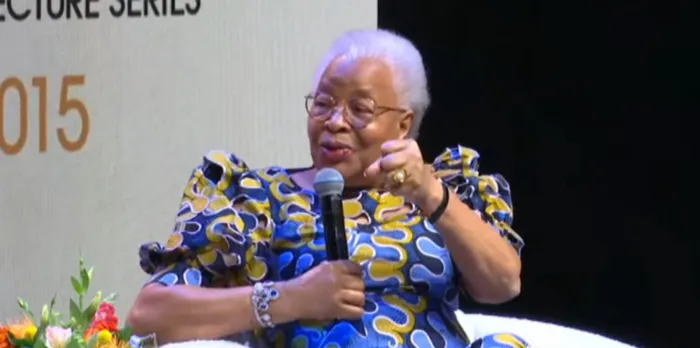Graça Machel backs dismantling of Afghanistan’s gender apartheid

With her fist balled up for most of her segment on the panel discussion during the 2023 Nelson Mandela lecture featuring Nobel Laureate Malala Yousafzai, former first lady of South Africa Graça Machel said the gender apartheid ravaging Afghanistan women should be dismantled. Picture: Screenshot/SABC
With her fist balled up for most of her segment on the panel discussion during the 2023 Nelson Mandela Lecture in Johannesburg featuring Nobel Laureate Malala Yousafzai, former first lady of South Africa Graça Machel said the gender apartheid ravaging Afghanistan women should be dismantled.
The widow of former President of Mozambique Samora Machel and former President of South Africa Nelson Mandela was asked by Yousafzai what lessons she could share, based on her experience in the struggle.
Machel, 78, with a riveting energy and radiance of a young woman, said that social mobilisation is one of the most powerful tools the women of Afghanistan and women across the world could use to dismantle the Taliban’s oppression of women in the country.
The veteran freedom fighter said if women around the world were serious about standing up against the plight of Afghanistan women, then they should approach every powerful person in the world and convince them that something needed to be done about it.
“We believe with the promise of 1994 here, it was never again for South Africa, but it was also never again for the rest of the human family.
“It never crossed our mind that it would be a legal system, a system of governance, which filters into all aspects of life - political, economic, social, cultural, religious, to make it a decree that we women don’t count.
“It was very easy for me to feel a sense of revolt and say it takes me back to those days because I am a black woman, I have been told I do not exist and don’t count.
“And now, simply because millions of human beings in Afghanistan happen to be female, they are not recognised as citizens of that country,” Machel said.
On August 15, 2021, the Taliban forces regained control of Kabul and then most parts of the 34 provinces, seizing power from the previous regime controlled by the United States government.
Since then, the Taliban has forced women in Afghanistan to live under their strict rule, which has stripped away the basic aspects of life and culture for women and young girls within its borders.
Speaking to some of the atrocities and hardships that Afghan women endure on a daily basis, was Maryam Mitra, who was speaking from exile as she was forced to flee her homeland because of her resistance to the Taliban rule.
“As I sit here, hundreds, if not thousands of Afghani women have been thrown in prison for protesting this crime against humanity,” Mitra said sombrely.
Also part of the panel was former Fees Must Fall activist and now Member of the National Assembly Nompendulo Mkhatshwa, who spoke on her experiences in pushing for the development of women's rights and opportunities in South Africa.
Mkhatshwa serves as the chairperson of the Portfolio Committee on Higher Education, Science and Technology.
During her lecture, Yousafzai said the world needed to recognise and criminalise gender apartheid in Afghanistan, as it is forcing many young girls in the country to fall into depression and drug use.
“We know that gender-based discrimination exists in every country, gender-based persecution exists in many countries, but gender apartheid is different. Apartheid is a system that is imposed and enforced by those in power.
“The very people who are supposed to protect their citizens in South Africa, defended such a system that it was somehow the natural order of things to segregate whites from non-whites.
“Similarly, in Afghanistan, the Taliban say that oppression of girls and women is a matter of religion. So let me say this as plainly as possible, that is only an excuse,” Yousafzai said.
IOL